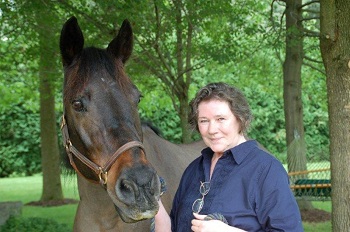
by Dr. Eleanor Kellon, VDM
"Performance horse" makes us think of things like speed work, endurance, upper level eventing and showing, but it's much more than that.
Let's define performance horses as those being asked to perform work in excess of their regular activity.
Feral horses travel as much as 20 miles per day in search of adequate food, water and salt. If you consider that as a baseline, horses grazing on good pastures or standing around in a stall or paddock all day have a long way to go to match it. Not so for a horse being ridden.
Keeping things at the walk for a moment, the feral horse is doing a lot less work than one carrying a rider. If you doubt that, try going about your daily activities wearing a back pack containing 1/5 of your weight. Carrying weight roughly triples the energy burned. An occasional stroll through the fields is one thing but if your horse is regularly doing trail rides, he's a performance horse. So is a horse or pony taking care of beginner riders several hours a day.
Obviously there is a difference between those horses and a horse in endurance training or any other extremely strenuous effort but they are more alike than you might think in the ways their bodies have to adapt.
As always, calories is the easy part. Increased calorie requirements depend on the individual metabolism (e.g. Thoroughbred versus air fern Morgan), duration and intensity of exercise. Your, or your trainer's,. experience with the individual and work type will determine how much to feed. The bottom line is always to maintain an appropriate body condition score.
However, when the speed of the work increases to trot or canter on a regular basis, this requires an adaptation of the muscle metabolism above and beyond what is needed by a feral horse moving around primarily at the walk. Carrying weight and advanced movements also increase demands on the muscle compared to what the horse's genetics provide at a baseline.
A robust response to the demands of exercise is facilitated by a targeted blend of key amino acids, minerals, vitamins and metbolites plus adaptogens to support a balanced stress response. Some horses struggle in specific areas such as breathing or have muscular challenges like meeting training milestones or muscular bulk.

Whatever the issue, there is supplemental support to help.
Daily Performance Pellet: Prepare your horse for the daily work with nutrients targeted to maximize high intensity training and performance. Designed to support energy, strength, power, speed, and recovery for the performance athlete. Daily Performance can be used on a daily, long-term basis for optimal performance, stress management and recovery.
Lung EQ promotes overall equine respiratory, lung and immune health for horses with respiratory reactions to environmental irritants and seasonal allergens. With Spirulina Platensis which may help stabilize the mast cells that release histamine. MSM supports normal regulation of inflammation. Flaxseed meal promotes balanced inflammatory pathways. Jiaogulan supports healthy histamine levels, open airways, and healthy immune response.
Muscle EQ: Muscle is your horse's motor. Keeping it properly fueled nutritionally can help the horse reach his natural potential for speed and endurance, maintain smooth gaits, hold better bulk/definition and enjoy muscles that are able to properly relax after work. By targeting key nutrients you can ensure there are no preventable barriers to smooth, efficient muscular activity.
About Dr. Kellon

Dr. Eleanor Kellon, staff veterinary specialist for Uckele Health & Nutrition, is an established authority in the field of equine nutrition for over 30 years, and a founding member and leader of the Equine Cushings and Insulin Resistance (ECIR) group, whose mission is to improve the welfare of horses with metabolic disorders via integration of research and real-life clinical experience. Prevention of laminitis is the ultimate goal. www.ecirhorse.org
Uckele Health & Nutrition, maker of CocoSoya, is an innovation-driven health company committed to making people and their animals healthier. On the leading edge of nutritional science and technology for over 50 years, Uckele formulates and manufactures a full spectrum of quality nutritional supplements incorporating the latest nutritional advances.
You can find Uckele Health & Nutrition in our section on Supplements.
There are lots of informative articles in our section on Health & Education.

































